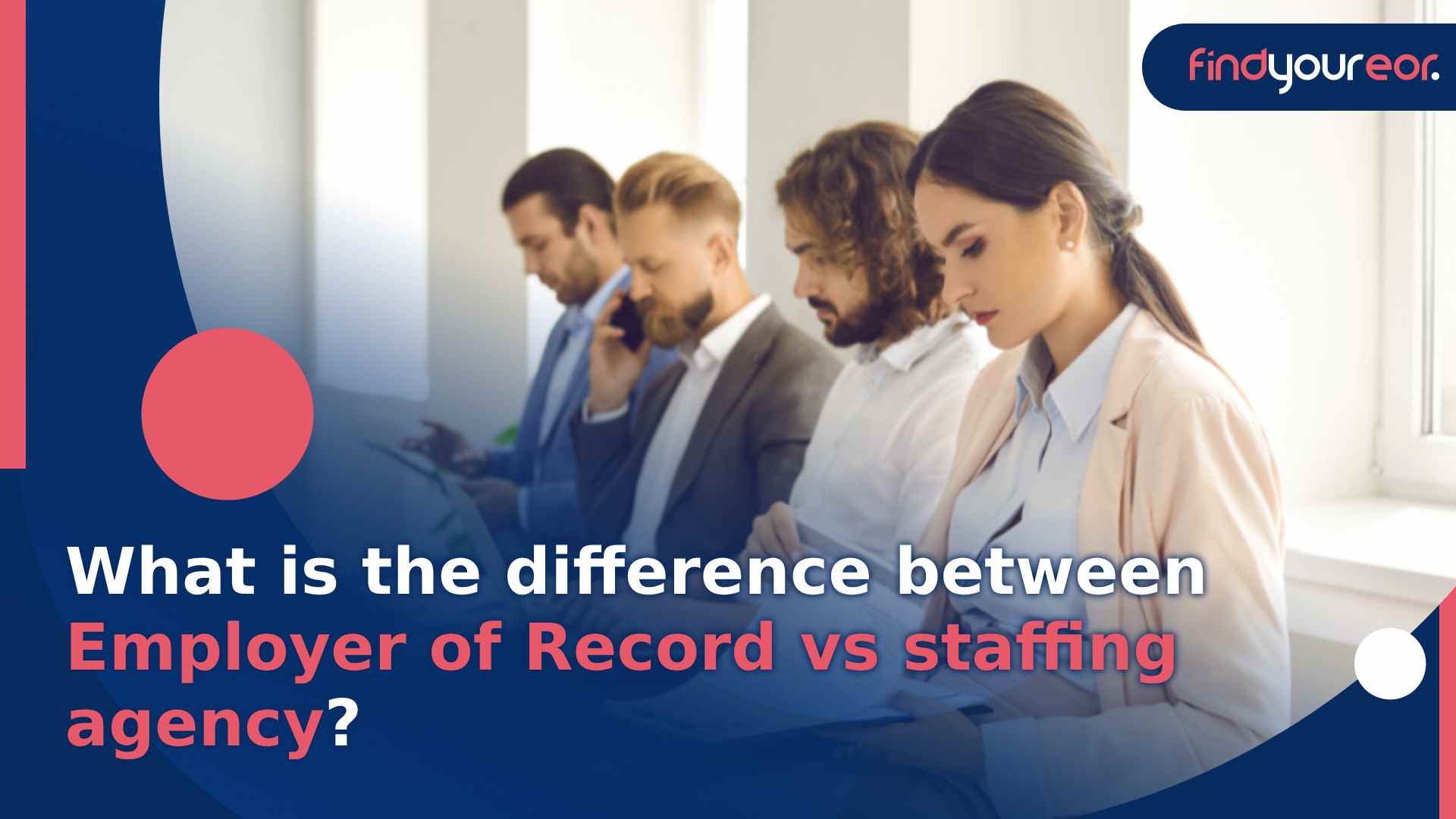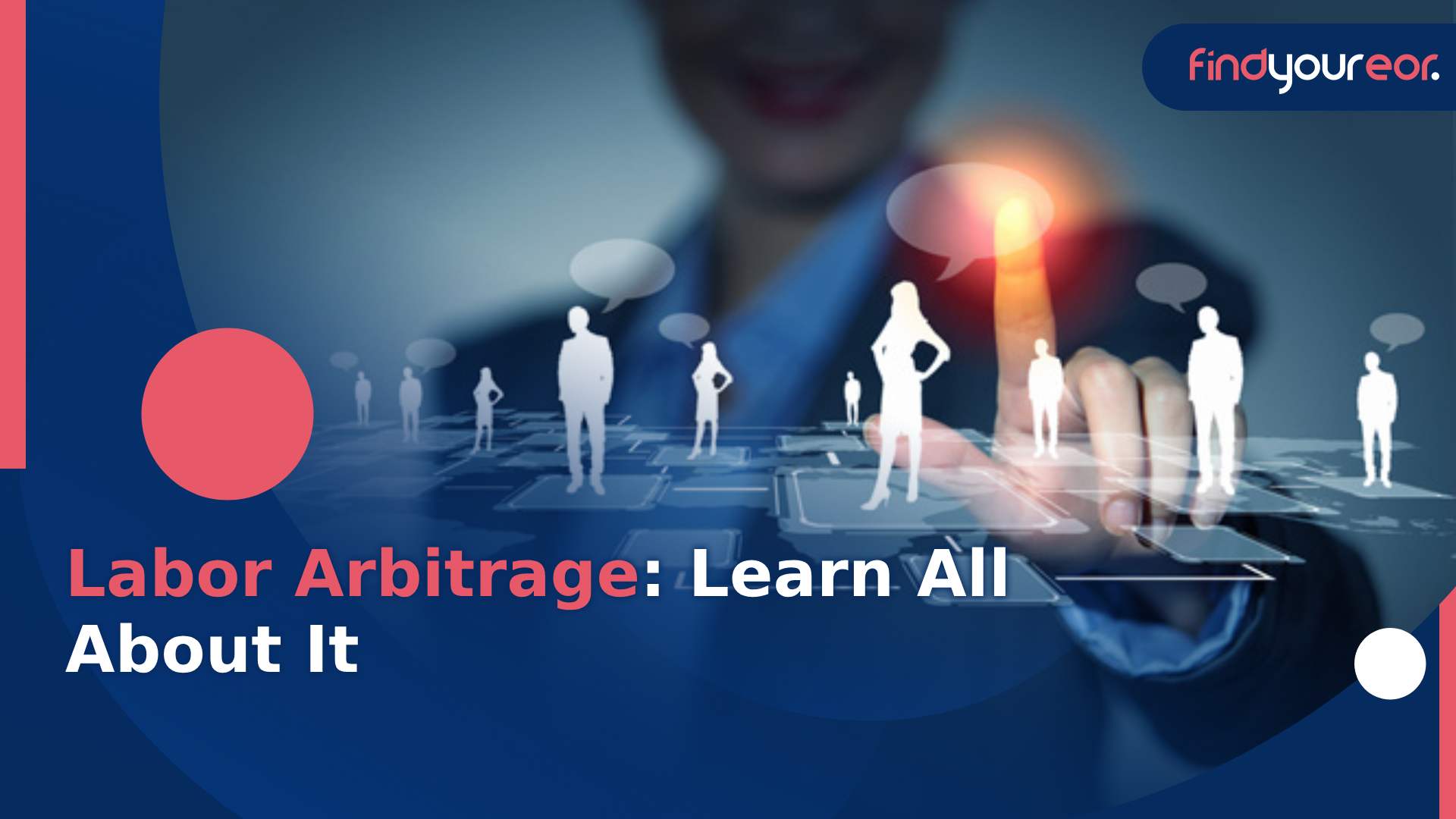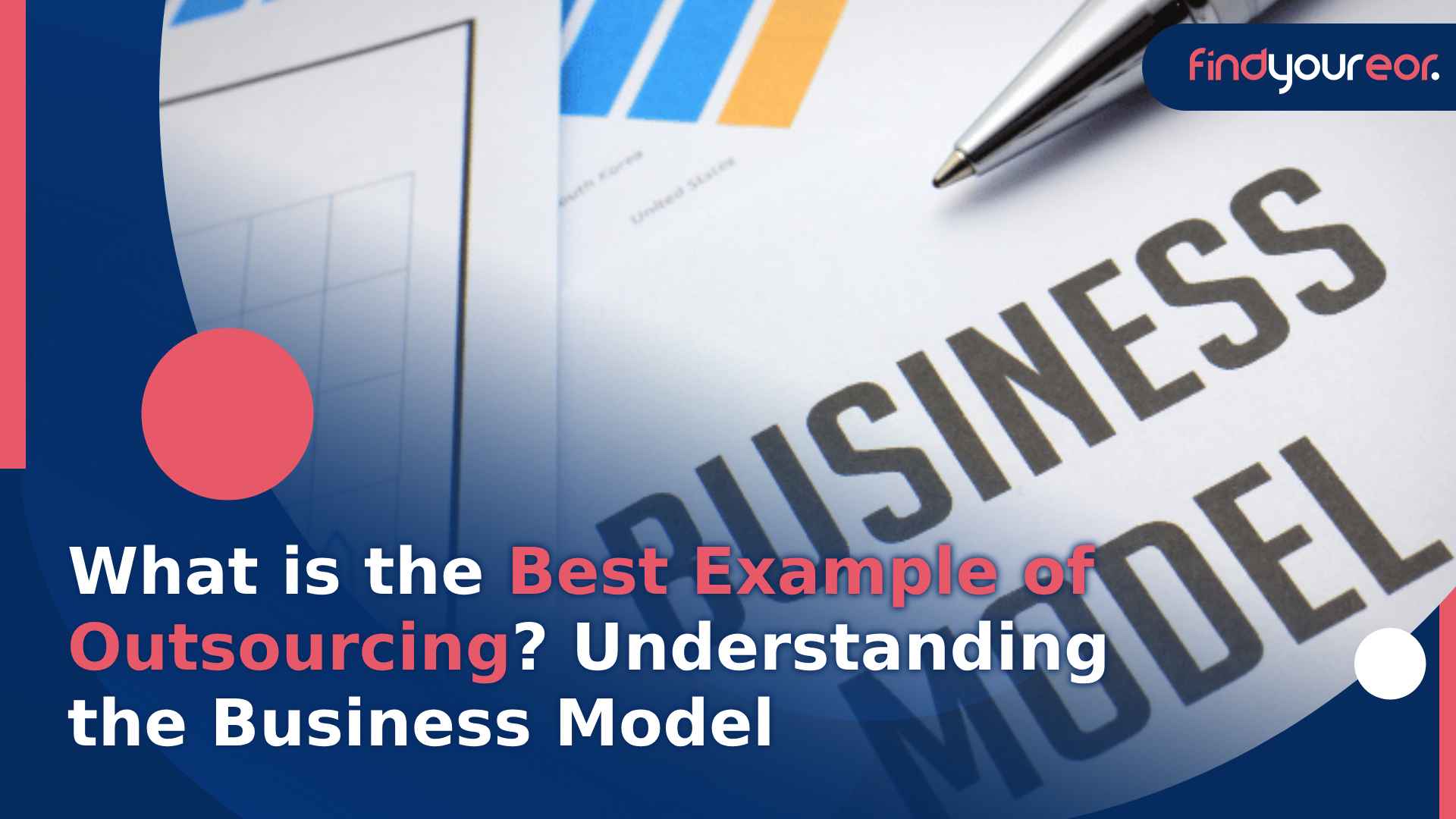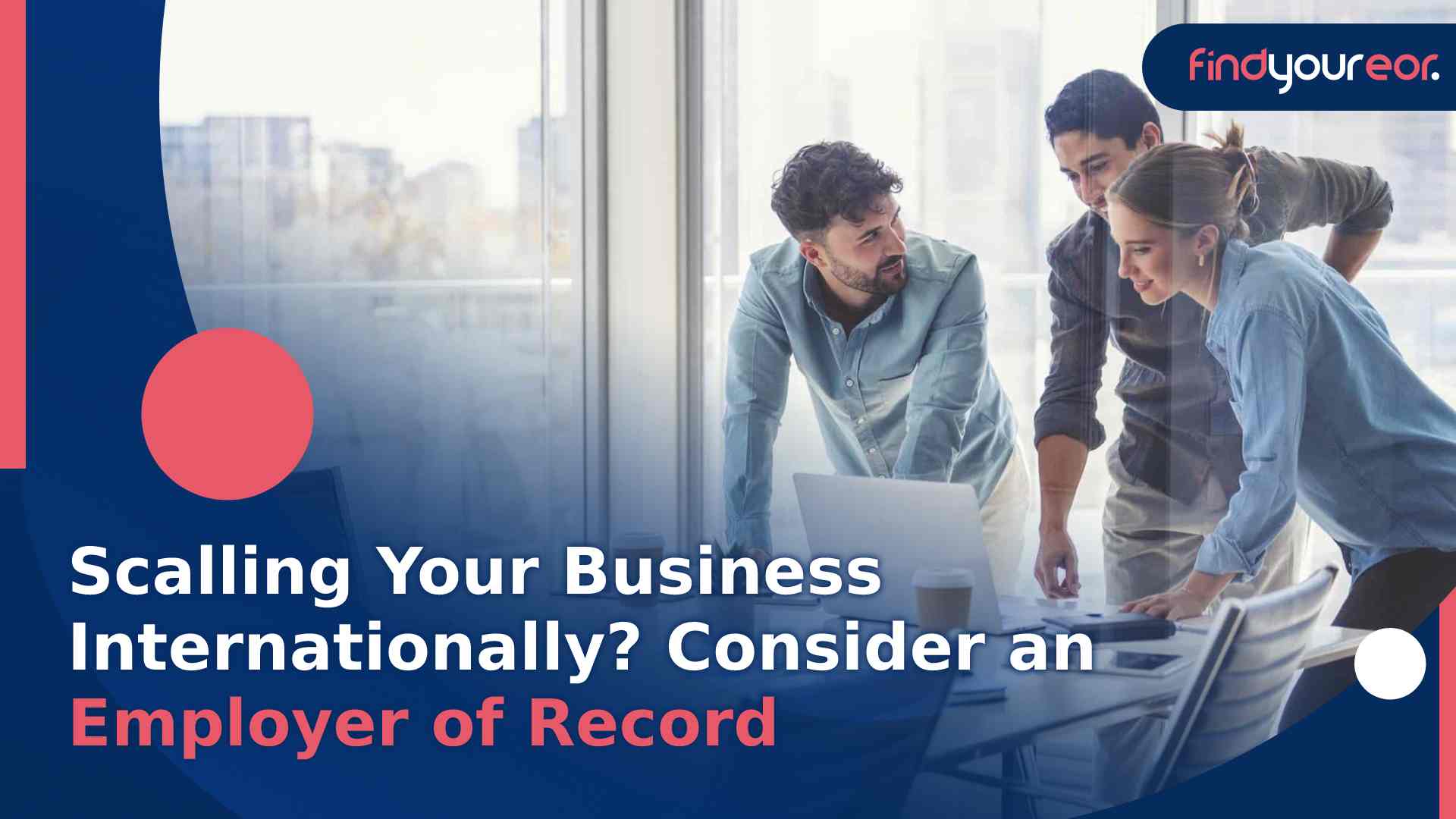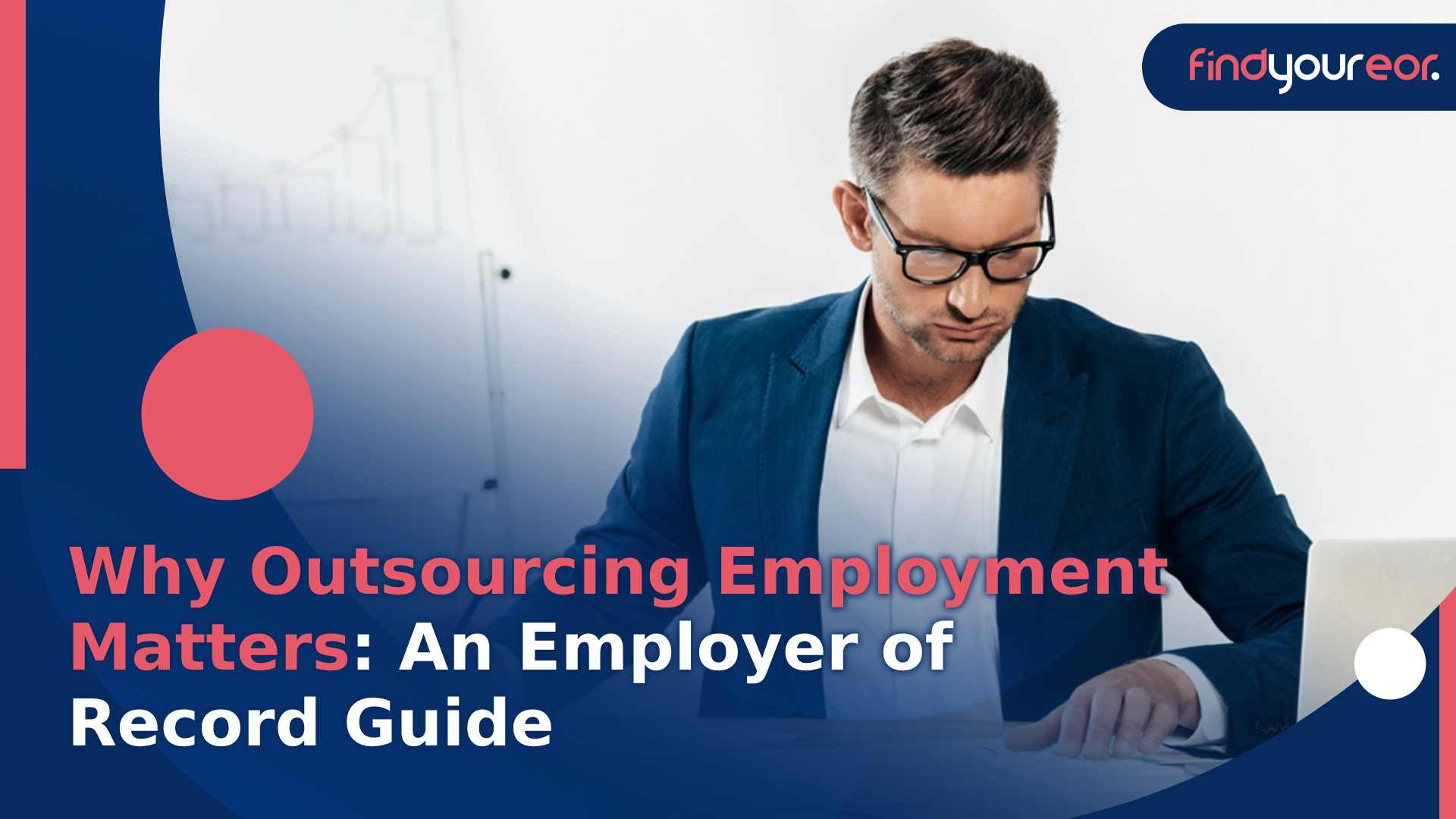What is the difference between Employer of Record vs staffing agency?
Last update: October 18th 2023
The daily chores involved in managing your personnel can mount up quickly. This is particularly relevant for businesses that employ contingent labor, who follow a completely different set of guidelines than full-time employees. As a result, most companies recur to third parties to outsource their HR management. There are various alternatives, however, most employers choose one of the two most popular ones, Employer of Record vs staffing agency.
In this article, we will be talking about EOR vs staffing company. Employer of Record (EOR) and staffing agency services are popular solutions for businesses looking for flexible and cost-effective ways to manage their workforce. Both solutions provide businesses with the ability to access skilled personnel for short-term or long-term projects quickly and easily. However, there are key differences between an EOR and staffing agency that should be considered when choosing the right option for your business.
What is a staffing agency?
A staffing agency is an organization that specializes in helping employers fill their staffing needs. Staffing agencies are a valuable resource for employers who need to fill positions quickly or are looking for specialized talent. They can provide employers with short-term or long-term staffing solutions. As well as help employers find the best candidates for open positions.
Staffing agencies typically work with employers to understand their staffing needs and then search for the best-suited candidates for the job. They use a variety of methods, such as job postings, networking, and recruiting events to find the right fit for the open position. Once they find a suitable candidate, they will present the candidate to the employer and negotiate a deal.
Staffing agencies are also great resources for job seekers. They can provide candidates with job postings, help them create a resume and provide resources to help them apply, and prepare for interviews. Likewise, they can provide direction and support during the job searching process.
Additionally, staffing agencies often offer additional services such as payroll processing, background checks, and drug testing. They can also provide employers with access to specialized talent pools. Plus, provide training and development services to employees.
Staffing vs recruitment: Key differences
Staffing and recruitment are two distinct processes in the Human Resources (HR) field. While they are related and often overlap, there are also fundamental differences between the two.
Staffing is a process of selecting and placing the right people in the right jobs in an organization. It involves identifying the job requirements and finding the most suitable candidates through an extensive process of interviewing and assessment. The main objective of staffing is to ensure that the right person is placed in the right job and that they have the skills and abilities to fulfill their role.
Recruitment, on the other hand, is the process of attracting, screening, and selecting qualified candidates for a particular job. It includes strategies such as advertising job openings, utilizing social media and job boards, and conducting interviews and assessments. Recruitment focuses on finding the best possible candidate for the job opening.
The main difference between staffing and recruitment is that staffing focuses on the selection of the right person to fill a job opening while recruitment focuses on finding the best person to fill the job opening. In other words, staffing is concerned with finding the right person for a particular job while recruitment is concerned with finding the best person for a particular job.
Another difference between staffing and recruitment is that staffing is more focused on internal operations, such as identifying existing staff and job requirements. Recruitment, on the other hand, is more focused on external operations, such as advertising job openings, networking, and assessing potential candidates.
Finally, staffing and recruitment differ in terms of their timelines. Staffing is typically a short-term process, while recruitment is often a longer-term process.
What is an Employer of Record (EOR), and what do they do?
An Employer of Record (EOR) is a third-party service provider that serves as an employer on behalf of an organization. This is mainly used by companies that need to expand their workforce but do not have the resources to recruit and manage employees in a foreign country. It is also frequently used by companies that want to outsource their payroll and human resource functions.
The Employer of Record is responsible for the recruitment, onboarding, and management of the workforce. This includes ensuring that all employees are properly registered, have their work permits, and are paid fairly and on time. The EOR is also responsible for compliance with the local labor laws, tax regulations, and other regulations in the region.
The Employer of Record can be a great solution for companies that are looking to expand into new markets or hire employees in foreign countries. It can provide the necessary support for companies to remain compliant with local labor laws and ensure that all employees are paid fairly and on time. The EOR can also take care of the paperwork and other administrative tasks associated with hiring and managing employees in a foreign country.
The Employer of Record is also beneficial for organizations that are looking to outsource their payroll and human resource functions. This allows them to focus on their core business instead of dealing with the complex regulations and paperwork. It also provides the necessary support for companies to remain compliant with local labor laws. Plus, ensure that all employees are paid fairly and on time with an Employer of Record vs staffing agency.
What is the difference between an Employer of Record vs staffing agency?
Employer of Record vs staffing agency are two different methods of managing a company’s workforce. Although both approaches are designed to help companies source, manage and pay their workforce, there are distinct differences between the two.
The primary difference between Employer of Record vs staffing agency is that an EOR is a legal entity that formally employs a company’s workforce. While a staffing agency is a third-party service provider that hires and places the workers and provides support services. With an EOR, the employer assumes all of the legal rights and responsibilities that come with formally employing the workforce. Including paying taxes, providing benefits, and meeting all other legal requirements. A staffing agency, on the other hand, does not formally employ the workforce. Therefore, it does not assume any legal obligations or responsibilities.
An EOR is typically a more cost-effective solution for employers because they are not charged a fee for the services they provide. This is in contrast to a staffing agency, which typically charges a fee for its services. Additionally, an EOR is often able to provide more streamlined and efficient hiring and onboarding processes than a staffing agency. This is because the EOR is more familiar with the company’s processes. So, they can tailor the onboarding experience to the company’s specific needs.
Another key difference between an Employer of Record vs staffing agency is that an EOR is typically more involved in the management of the workforce. An EOR will often provide additional services such as managing benefits, providing employee training, and providing performance reviews. A staffing agency, on the other hand, is usually focused on the placement of the workforce and does not typically provide additional services.
How can an EOR help businesses cut costs?
One of the primary ways an Employer of Record can help companies cut costs is by handling payroll services. This includes processing payroll and issuing paychecks and other payments. As well as managing taxes and other payroll-relating tasks. By outsourcing payroll to an Employer of Record, companies can avoid the need to hire a payroll specialist and the associated costs. Moreover, an EOR can provide expertise on employee tax filing requirements and ensure compliance with applicable regulations.
Employers of Record can also help companies save money by handling employee benefits administration. This includes managing the enrollment and termination of employee benefits, as well as providing ongoing support with benefit-related questions and claims. Companies can avoid the need to hire a benefits specialist, as well as the associated costs. Additionally, an Employer of Record can provide expertise and guidance on employee benefits. This can help ensure that the company is compliant with applicable laws and regulations.
An Employer of Record can also help companies save money by handling employee recruitment and onboarding. This includes sourcing and recruiting candidates, conducting background checks, and managing the onboarding process. By outsourcing these tasks to an Employer of Record, companies can avoid the need to hire a dedicated recruitment specialist and the associated costs. Furthermore, an EOR can provide expertise on employee recruitment and onboarding. It can help ensure a smooth transition for new employees.
Overall, an Employer of Record can provide a range of cost-cutting options for companies. By handling payroll, benefits, and recruitment services, an EOR can help companies reduce their costs and ensure compliance with applicable regulations. Additionally, an EOR can provide expertise and guidance on employee-related tasks. This can help ensure that the company is compliant with applicable laws and regulations.
How does an EOR minimizes liability for businesses?
· The first way an Employer of Record reduces liability for businesses is by providing a comprehensive and compliant employment package. This includes a written employment agreement that covers the legal obligations of both the employer and employee. This agreement will cover everything from pay and hours to benefits and termination. So, this reduces the risk of litigation in the event of a dispute between the employer and employee.
· The second way an Employer of Record reduces liability for businesses is by taking on the payroll and tax responsibilities for the employer. This includes calculating and paying employee taxes, filing and submitting all required tax forms, and managing payroll regulations. This eliminates the risk of non-compliance with current tax laws, which could lead to costly penalties and fines.
· The third way an Employer of Record reduces liability for businesses is by managing employee benefits. This includes providing health insurance, retirement plans, vacation days, and other benefits. An Employer of Record ensures that these benefits are compliant with applicable regulations and are properly managed. This reduces the risk of employee claims of discrimination or unfair treatment.
· Finally, an Employer of Record reduces liability for businesses by providing a comprehensive risk management program. This includes ensuring that all employment practices. Such as hiring, promotion, and termination, are properly documented and compliant with applicable laws. Additionally, an employer of record will provide guidance and assistance with any employment-related legal matters.
Why should businesses partner with an Employer of Record?
Businesses, particularly small and medium-sized companies, can benefit immensely from partnering with an Employer of Record vs staffing agency. An EOR is an organization that specializes in managing the HR-related components of hiring employees. They provide a range of services such as recruiting, onboarding, payroll, and benefits administration.
The primary reason for partnering with an EOR is to save time and money. By partnering with an EOR, businesses can outsource their HR-relating tasks to a third-party organization, allowing them to focus on their main commercial activity. This is especially beneficial for small businesses that do not have the resources to invest in a full-time in-house HR team. Additionally, EORs are also able to provide expert advice and access to resources that can help businesses make strong employment decisions.
Another key benefit of partnering with an Employer of Record vs staffing agency is the ability to quickly and easily scale operations. When businesses work with an EOR, they can quickly and easily add or remove employees as needed. This is a great advantage for businesses that experience seasonal fluctuations in their business operations or are looking to expand their workforce.
Finally, partnering with an EOR is beneficial for businesses because it allows them to stay compliant with local labor laws and regulations. This is essential for businesses that operate in multiple locations or countries. As they must adhere to the different laws and regulations of each jurisdiction. By working with an EOR, businesses can ensure that they are compliant with the laws and regulations of each jurisdiction.
Conclusion
In a nutshell, an Employer of Record will contribute to the efficient and effective management of your contingent labor throughout the entire process. An Employer of Record vs staffing agency can help you save time and money. This, while allowing internal HR staff to concentrate on other crucial areas of the company.
Your company can benefit greatly from the value and efficiency that contingent workers can provide. However, it is crucial to have the right infrastructure set up to guarantee their proper administration and supervision. So, now that you know all about Employer of Record vs staffing agency, you can make the best decision.







